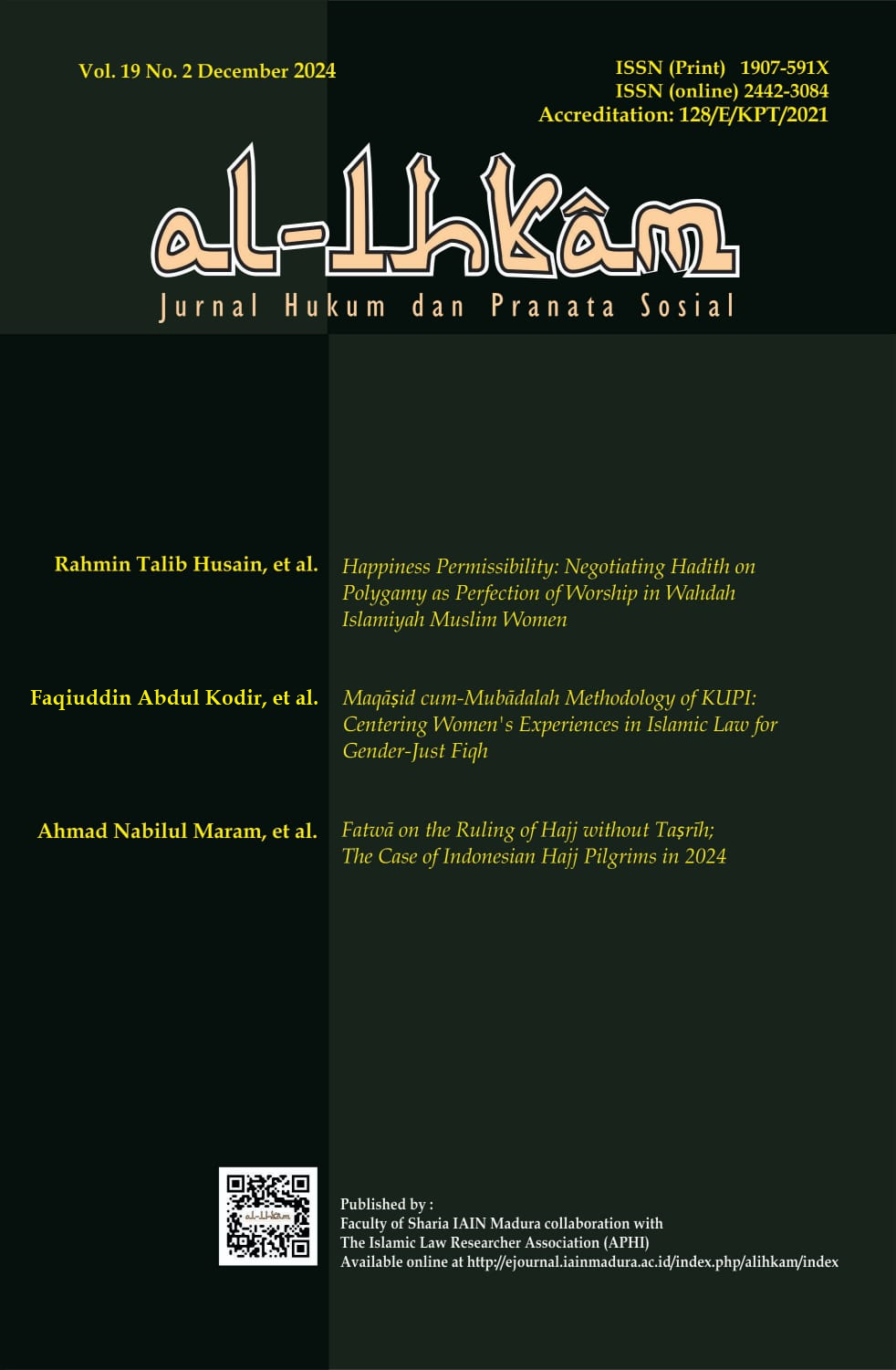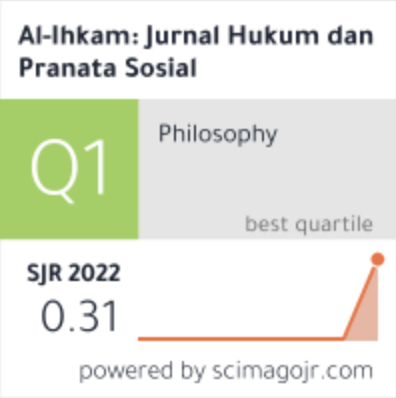Happiness Permissibility: Negotiating Hadith on Polygamy as Perfection of Worship in Wahdah Islamiyah Muslim Women
 Abstract views: 829
,
Abstract views: 829
,
 PDF downloads: 438
PDF downloads: 438
Abstract
The practice of polygamy, which is debated among women, is accepted by Wahdah Islamiyah Muslim women as an embodiment of religious teachings enshrined in the hadith. This acceptance does not negate the complexities and contradictions inherent in the hadith that discuss the practice. This study explores the reading position of Wahdah Islamiyah Muslim women in understanding and practicing the hadith of polygamy. Using qualitative methods, data were collected through in-depth interviews with 12 persons consisting of 5 first wives, 5 second wives, 1 da’īyah (preacher), and 1 head of the Wahdah Islamiyah Muslim women. In-depth observations were also made of key informant activities. The data were analyzed using a fiqh (Islamic Jurisprudence) analysis model combined with the framework of Stuart Hall's reception theory. The findings of this study reveal three different reading positions: 1) The hegemonic reading model using the argument of belief in an authoritative text. 2) the negotiated reading model emphasizing the fulfillment of the husband's needs driven by concerns about the husband's compliance with the principles of justice. 3) the oppositional reading model rooted in the vulnerability of wives who challenge of ensuring fair treatment. These three positions emerge from the structure of the hadith discourse where the textual affirmation of polygamy serves as the basis for its resolution. The incorporation of settlement in an interpretive and counterintuitive perspective in the development of fiqh signifies a full acceptance of the law while also considering the goals of responsible individuals (maqāṣid al-mukallafīn).
Downloads
References
Abidin Bahren, Rina. “Resolving The Contradictory Hadiths on Cupping.” Proceedings of the 5th International Graduate Conference in Islam and Interdisciplinary Studies, IGCIIS 5 (2023): 1–14. https://doi.org/10.4108/eai.19-10-2022.2329071.
Adenike, Adesehinwa Olayinka. “Effects of Family Type (Monogamy or Polygamy) on Students’ Academic Achievement in Nigeria.” International Journal of Psychology and Counselling 5, no. 7 (2013): 153–56. https://doi.org/https://doi.org/10.5897/IJPC10.012.
Afandi, Moh, Ahmad Agus Ramdlany, Nilna Fauza, Siti Khoirotul Ula, and Mohammad Farah Ubaidillah. “Authority, Culture, and Sexuality in the Polygamy of Madurese Ulamas.” Ahkam: Jurnal Ilmu Syariah 24, no. 1 (2024): 1–16. https://doi.org/10.15408/ajis.v24i1.36237.
Al-Jauzīyah, Ibn al-Qayyīm. Tahżīb Sunan Abī Dāwud Wa Iḍāḥ ’Illalih Wa Musykilātih, Vol. 1. Bairut: Dār Ibn Ḥazm, 2019.
Al-Namlah, Abd al-Karīm bin ’Alī. Al-Jāmi’ Li Masā’il Uṣūl Al-Fiqh Wa Taṭbīqāihā ’alā Al-Madhhab Al-Rājiḥ. Al-Riyāḍ: Maktabah al-Rusyd, 2000.
Al-Subkī, Ali bin ’Abd al-Kāfī. Al-Ibhāj Fī Syarḥ Al-Manhāj, Vol. 6. Dubai: Dār al-Buḥūṡ li al-Dirāsah al-Islāmiyah wa Iḥyā’ al-Turāṡ, 2004.
Al-Zarkasyī, Badr al-Dīn. Salāsil Aż-Żahb. Madinah: Al-Muḥaqqaq, 2002.
Auda, Jasser. Maqāṣid asy-Syarī‘ah as Philosophy of Islamic Law: A Systems Approach. London: The International Institute of Islamic Thought, 2007.
Bahri, Syaiful. “Paradigma Fikih Baru Jamal al-Banna dan Relevansinya Terhadap Pembaruan Peran Perempuan dalam Hukum Keluarga Islam (Fiqh al-Munākahāt).” Ijtihad : Jurnal Wacana Hukum Islam dan Kemanusiaan 19, no. 1 (2019): 1–26. https://doi.org/10.18326/ijtihad.v1i1.1-26.
Ball, Vicky, and Christine Gledhill. “Cultural Representations and Signifying Practices.” In Genre and Gender: The Case of Soap Opera, edited by Barry Hall, 347–48. London: Culture, Media and Identities series, 2012. http://sure.sunderland.ac.uk/id/eprint/2611.
Barthes, Roland. “Rhetoric of the Image.” Communications 4, no. 1 (1964): 40–51. https://doi.org/https://doi.org/10.3406/comm.1964.1027.
Brown, Jonathan. “Scripture, Legal Interpretation and Social Praxis in the Islamic Tradition: The Cases of Polygamy and Slavery.” Religious Minorities In Christian, Jewish and Muslim Law (5th–15th Centuries) 43 (2017): 99–113. https://doi.org/10.1484/m.relmin-eb.5.111594.
Clarke, John, and Tony Jefferson. “CCCS Selected Working Papers.” In Working Class Youth Cultures, edited by Ann Gray et Al., Volume 2., 207. London: Routledge, 2007.
Creswell, John W. Research Design: Qualitative and Quantitative Approaches. London: SAGE Publications, 1994.
Dozan, Wely. “Fakta Poligami Sebagai Bentuk Kekerasan Terhadap Perempuan: Kajian Lintasan Tafsir dan Isu Gender.” Marwah: Jurnal Perempuan, Agama dan Jender 19, no. 2 (2021): 131. https://doi.org/10.24014/marwah.v19i2.11287.
Editors. “Profil Lembaga Muslimah.” wahdah.or.id, 2024. https://wahdah.or.id/profil-lembaga-muslimah/.
Gellner, Ernest. “Universities as Vectors of Cultural Diplomacy: The Case of Mexico.” In The Politics of Culture: An Interrogation of Popular Culture, edited by Elena Colombo and Robyn Muir Ibtisam Ahmed, 21–40. London: Cambridge University Press, 2020.
Hall, Stuart. “CCCS Selected Working Papers: Volume 2.” In Encoding and Decoding in the Television Discourse, edited by Ann Gray et Al. Oxon: Routledge, 2007.
———. “Encoding-Decoding (1980).” In Crime and Media, edited by Chris Greer, 1st Editio., 44–55. London: Routledge, 2019. https://doi.org/https://doi.org/10.4324/9780367809195.
———. “Encoding/Decoding.” In Culture, Media, Language: Working Papers in Cultural Studies, edited by Stuart Hall, 1972–1979. London: University of Birmingham, 2005.
———. “Representation.” In Introduction, 9–10. London: SAGE Publications, 1997.
Harahap, Khoirul Amru. “Kebijakan Pemerintah Republik Indonesia dan Hukum Islam Mengenai Poligami: Sebuah Kajian Perbandingan.” Volksgeist: Jurnal Ilmu Hukum dan Konstitusi 2, no. 1 (2019): 89–105. https://doi.org/10.24090/volksgeist.v2i1.2684.
Hasaballah, Ali. Uṣūl Al-Tasyrī’ Al-Islāmī. Cairo: Dār al-Ma’ārif, n.d.
Ḥazm, ʿAlī ibn Aḥmad Ibn. Al-Iḥkām fī Uṣūl al-Aḥkām, Vol. 1. Cairo: Maṭbaʿat al-Imām, n.d.
Kamarudin, Kamarudin, and Sabil Mokodenseho. “A Debate on the Islamic Practice of Pilgrimage to the Grave: Study of the Hadīth on Grave Pilgrimage for Women.” Al-Quds: Jurnal Studi Alquran dan Hadis 6, no. 2 (2022): 495. https://doi.org/10.29240/alquds.v6i2.4390.
Muzaki, Ahmad, Sayful Islam Ali, and Moh Toriquddin. “Kajian dan Analisis Hadis tentang Poligami.” El-Sunnah: Jurnal Kajian Hadis dan Integrasi Ilmu 1, no. 2 (2021): 162–75. https://doi.org/10.19109/elsunnah.v1i2.8937.
Muzakki, Ahmad. “Sosiologi Gender: Poligami Perspektif Hukum Islam.” Lisan al-Hal: Jurnal Pengembangan Pemikiran dan Kebudayaan 10, no. 2 (December 2016): 353–72. https://doi.org/10.35316/lisanalhal.v10i2.128.
Nadeem, Muhammad Tayyeb. “Al-Jāddah al-Qawīmah fi al-Fiqh: Analyzing the Juristic (Re) Interpretation of Shāh Walī Allāh for Reconciliation among Fiqhī Polemics.” Majallah-e-Talim o Tahqiq 3, no. 2 (2021): 172–82. https://ojs.cer.edu.pk/index.php/mtt/article/view/154.
Nasution, Hotnidah, and Ahmad Rifqi Muchtar. “Negotiating Islamic Law: The Practice of Inheritance Distribution in Polygamous Marriages in Indonesian Islamic Courts.” Al-Manahij: Jurnal Kajian Hukum Islam 18, no. 1 (2024): 125–44. https://doi.org/10.24090/mnh.v18i1.10921.
Osman, Amr. The Ẓāhirī Madhhab (3rd/9th–10th/16th Century): A Textualist Theory of Islamic Law. Leiden: Brill Academic Publishers, 2010.
Pelu, Ibnu Elmi A.S., Jefry Tarantang, Ahmad Fauzi, Muhammad Hafiz Badarulzaman, Ramdani Wahyu Sururie, and Syahrul Anwar. “Polygamy Law Reform Through the Development of the Aceh Qanun: A New Approach to Protecting the Rights of Women and Children in Indonesia.” El-Mashlahah 14, no. 1 (2024): 149–68. https://doi.org/10.23971/el-mashlahah.v14i1.7864.
Philips, Abu Ameenah Bilal, and Jameelah Jones. Polygamy in Islam. Buraydah: Tawheed Publications, 1999.
Rohmansyah. “Polygamy in the Text of the Qur an, Hadith and Bible: Theory Systems Approach of Jasser Auda.” Al-Ihkam: Jurnal Hukum dan Pranata Sosial 14, no. 2 (2019): 320–41. https://doi.org/10.19105/al-lhkam.v14i2.2529.
Sa’dan, Masthuriyah. “Poligami Atas Nama Agama: Studi Kasus Kiai Madura.” Esensia: Jurnal Ilmu-Ilmu Ushuluddin 16, no. 1 (2015): 89–100. https://doi.org/10.14421/esensia.v16i1.989.
Safitri, Erwanda. “Pemahaman Hadis tentang Poligami (Sebuah Kajian Teologis Terhadap Hadis-Hadis Sosial tentang Poligami).” Jurnal Studi Ilmu-Ilmu al-Qur’an dan Hadis 17, no. 2 (2018): 187. https://doi.org/10.14421/qh.2016.1702-02.
———. “Pemahaman Hadis tentang Poligami (Sebuah Kajian Teologis Terhadap Hadis-Hadis Sosial tentang Poligami).” Jurnal Studi Ilmu-Ilmu al-Qur’an dan Hadis 17, no. 2 (2018): 187. https://doi.org/10.14421/qh.2016.1702-02.
Saleh M, Marhaeni. “Eksistensi Gerakan Wahdah Islamiyah Sebagai Gerakan Puritanisme Islam di Kota Makassar.” Aqidah-Ta : Jurnal Ilmu Aqidah 4, no. 1 (2018): 73–94. https://doi.org/10.24252/aqidahta.v4i1.5174.
Santiwi, Zunita. “Sunnah Sebagai Alasan Permohonan Poligami (Studi Kasus Nomor 1142/Pdt. G/2019/PA. Po).” Institut Agama Islam Negeri Ponorogo, 2020.
Sardar, Ziauddin. Reading the Qur’an: The Contemporary Relevance of the Sacred Text of Islam. New York: Oxford University Press, 2011.
Sarib, Suprijati, Eti Yusnita, Cholidah Utama, and Muhammad Irfanul Hakim Zain. “Polygamy among Muallaf in Manado: Islamic Legal Perspectives and Social Challenges.” Juris: Jurnal Ilmiah Syariah 23, no. 2 (2024): 241–52. https://doi.org/10.31958/juris.v23i2.12307.
Sattam, Abdul Aziz bin. Sharia and the Concept of Benefit: The Use and Function of Maslaha in Islamic Jurisprudence. London: I.B. Tauris, 2015.
Syamsuddin, Sukring. “A Legal Debate on Polygamy: Classical and Contemporary Perspectives.” Esensia: Jurnal Ilmu-Ilmu Ushuluddin 19, no. 2 (2018): 147–60. https://doi.org/https://doi.org/10.14421/esensia.v19i2.1735.
Copyright (c) 2024 AL-IHKAM: Jurnal Hukum & Pranata Sosial

This work is licensed under a Creative Commons Attribution-ShareAlike 4.0 International License.
In order to be accepted and published by Al-Ihkam: Jurnal Hukum dan Pranata Sosial, author(s) submitting the article manuscript should complete all the review stages. By submitting the manuscript, the author(s) agreed to the following terms:
- The copyright of received articles shall be assigned to Al-Ihkam: Jurnal Hukum dan Pranata Sosial as the publisher of the journal. The intended copyright includes the right to publish articles in various forms (including reprints). Al-Ihkam: Jurnal Hukum dan Pranata Sosial maintain the publishing rights to the published articles.
- Authors are permitted to disseminate published articles by sharing the link/DOI of the article at Al-Ihkam: Jurnal Hukum dan Pranata Sosial. Authors are allowed to use their articles for any legal purposes deemed necessary without written permission from Al-Ihkam: Jurnal Hukum dan Pranata Sosial with an acknowledgment of initial publication to this journal.
- Users/public use of this website will be licensed to CC-BY-SA.



.png)
_1.png)










